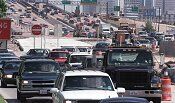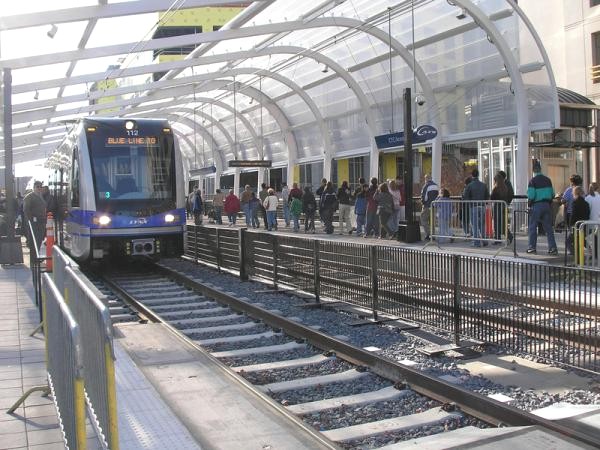The Case for Public Transportation
It is the view of the Commission that public transportation, especially in the form of electric railways,
must and will play a significantly larger role in Americans' mobility. Federal transportation policy
should not only accommodate but encourage this development.
Many of the factors leading to an increased role for public transportation
are widely recognized. They include:
 • Increasing traffic congestion, especially in urban areas. In addition to decreasing quality of
life, traffic congestion imposes real economic costs. According to the Texas Transportation Institute's
2007 Urban Mobility Report, delays per peak period traveler increased from 14 hours per year in
1982 to 38 hours in 2005 for all urban areas in the United States. For the 14 largest urban areas,
delay has risen from 21 hours per peak period traveler in 1982 to 54 hours in 2005.
• Increasing traffic congestion, especially in urban areas. In addition to decreasing quality of
life, traffic congestion imposes real economic costs. According to the Texas Transportation Institute's
2007 Urban Mobility Report, delays per peak period traveler increased from 14 hours per year in
1982 to 38 hours in 2005 for all urban areas in the United States. For the 14 largest urban areas,
delay has risen from 21 hours per peak period traveler in 1982 to 54 hours in 2005.
• The failure of many urban areas to meet Federally-mandated air quality standards. A shift of
commuter travel from private automobiles to electric railways (which include some commuter rail,
Heavy Rail (subways) Light Rail and streetcars) can play a significant role in reducing air pollution.
Public Transportation's Contribution to U.S. Greenhouse Gas Reduction, published by SAIC [Science
Applications International Corporation] in 2007, finds that a solo commuter switching his commute to
existing public transportation can reduce his CO2 emissions by 20 pounds in a single day or more
than 4,800 pounds in a year. Greater savings would result from new electric rail service powered by
non-fossil fuel generated electricity.
• The difficulty of constructing new urban freeways in the face of land use, right-of-way cost
and environmental obstacles. As has repeatedly been demonstrated, the phenomenon of
"suppressed demand" quickly leads to renewed congestion on any new freeways that can be built.
Generated Traffic and Induced Travel Implications for Transport Planning, published by the Victoria
Transport Policy Institute in 2007, described research reports that found new highways would attract
enough traffic to be filled to capacity or near capacity within a few years after they opened.
• The negative impact of automobiles and especially of limited-access highways on urban
vitality, which contrasts strongly with the ability of electric railways generally and streetcar systems in
particular to stimulate urban re-development.
• The rising price of gasoline, which leads commuters away from the private automobile and
towards increased use of public transportation. To these well-known factors pointing toward greater
reliance on mass transit, a highly important new consideration must be added: national security.
Americans' dependence on automobiles fueled largely with imported oil is the Achilles' heel of our
current foreign and national security policy. Rising oil prices threaten the prosperity of our economy,
with dependence on oil imported from unstable regions adding the risks of actual fuel cutoffs, limited
foreign policy options, and wars over oil sources and supplies. The Energy Information Administration
reported that 71 million barrels of petroleum were imported from the Persian Gulf region in June of
2007, 18 percent of all petroleum imports. According to the same source, spot oil prices were $81.51
per barrel on September 18, 2007, over $50 dollars more than the $27.26 per barrel spot oil price just
four years earlier.
In the face of the Global War on Terrorism, providing Americans with mobility that is not dependent
on foreign oil may be second in importance only to securing our homeland against direct terrorist
attack. Just as the Cold War brought about the National Defense Interstate Highway Act, so we think
it probable that the future will require a National Defense Public Transportation Act. Current and
near-future national transportation policy should take this likelihood fully into account.
As we look toward increasing reliance on public transportation, we must recognize that all public
transit is not alike. In particular, public policy must acknowledge that buses and rail transit are not
fungible. In addition to the obvious advantage of electrification, rail transit, including streetcars, light
rail, heavy rail and commuter rail (which should in most cases be electrified once certain densities are
reached) serve different markets and perform different functions from buses.
Key differences between bus and rail transit include:
• Rail transit has repeatedly demonstrated its success in drawing riders from choice, people
who have a car and could drive but choose to take transit instead, while buses generally carry only
the transit-dependent, those who have no other way to get around. This means that rail transit, but
not buses, has a significant potential impact on traffic congestion. For whatever reasons, it is a fact
that most Americans like riding trains and streetcars but do not like riding buses. If our national
transportation policy is to be realistic, it must take this fact into account. A Profile of Public
Transportation Passenger Demographics and Travel Characteristics reported in On-Board Surveys,
published by the American Public Transportation Association in 2007, reported that 38 percent of bus
and paratransit riders had an automobile available when they took a transit trip while 58% of rail
travelers had an automobile available for their trip.
 Charlotte's new Lynx light rail transit system has demonstrated it can draw commuters out of their cars.
Ridership has been well over projections since starter line opened in November 2007.
Charlotte's new Lynx light rail transit system has demonstrated it can draw commuters out of their cars.
Ridership has been well over projections since starter line opened in November 2007.
[Photo: Carolina Tim]
• Rail transit, but not buses, has a demonstrated ability to spur development and, importantly,
re-development in urban cores. Streetcar systems, which can be built inexpensively, have shown a
particularly strong and positive impact on urban re-development. Portland Streetcar: Development
Oriented Transit, prepared by the Portland, Oregon, Office of Transportation and Portland Streetcar,
Inc., in 2006, found that since 1997 $2.3 billion had been invested within two blocks of the streetcar
right-of-way, including 7,248 new housing units and 4.6 million square feet of office, institutional,
retail, and hotel construction. The Little Rock, Arkansas, Regional Chamber of Commerce, in "About
Little Rock," calls the River Rail streetcar line, which opened in 2004, a "magnet for new businesses
and development, another attraction for large conventions and one of several jewels in the
restoration of two reviving downtown areas."
• While bus lines can be electrified, very few have been. In contrast, most new rail transit
projects envision electric railways of one variety or another. In our view, both environmental and
national security considerations should lead Federal transportation policy to favor electrified over
non-electrified modes of travel. What changes in Federal transportation policy do the above
considerations suggest? First and foremost, Federal policy should include a clear and unambiguous
endorsement of a shift away from the private automobile to public transportation for travel in urban
areas. It should be the objective of the Federal government to bring all aspects of transportation
policy in line to support and encourage this shift, including provision of adequate resources.
Further, it should become Federal government policy to encourage the growth and spread of
electrified rail transit as something that contributes directly to national security as well as strengthens
efforts to re-develop our nation's urban cores. Public Transit in America: Analysis of Access Using
the 2001 National Household Travel Survey, published in 2007 by the Center for Urban
Transportation Research, found that 53 percent of U.S. households were within one mile of bus
service and 40 percent were within one-quarter mile, but only 10 percent of the population lives within
one mile of rail transit. National security considerations suggest that funding the spread of electrified
rail transit should be considered a national security function, at least in part.
These recommendations in turn suggest at least two actions be undertaken immediately. First, FTA
criteria for the evaluation of requests for funding for electric rail projects, especially streetcars, should
be re- written to take all relevant factors into account, including development impact, and to remove
criteria that are not relevant, such as time of travel for streetcars. Second, the Small Starts funding
program, which originated as the Blumenauer bill, should be returned to its original purpose, which
was to encourage new streetcar systems. A streetcar system is a logical first step toward electrified
rail transit for cities that currently have no rail transit, which means such new starts should receive
especially strong encouragement in Federal transportation policy.
More broadly, Federal support for public transportation generally and electrified rail transit in
particular should be made automatic, based on the population of the area served. For example, a city
of 50,000 might qualify for automatic approval for a bus system (preferably with electric buses); an
urban area of 100,000 for streetcars; of 250,000 for Light Rail. FTA approval would not be required
for proposals fitting within each category (it would still be necessary for projects that lay outside the
approved categories, e.g., Light Rail for a city of 50,000). Currently, a total of 72 urbanized areas
have one or more types of rail service. There are 266 urbanized areas with populations greater than
100,000, of which just 27 currently have Light Rail service. 128 of those have populations greater
than 250,000, of which only 26 have Light Rail service. Five of the largest urbanized areas without
Light Rail do have Heavy Rail Systems, which are the basic level of rail service for those very large
areas.
Most of those cities once had electric railways. They lost them, not to the fair market, but to massive
government intervention in favor of highways and cars. As early as 1921, government was pouring
$1.4 billion into highways. In contrast, the vast majority of electric railways were privately owned,
received no government assistance and had to pay taxes. Further, their fares were often controlled
by local governments, which did not allow them to rise despite inflation. As a result, by 1919 one-third
of the country's streetcar companies were bankrupt. After World War II, many local governments
completed the destruction of their community's electric railways by pressuring transit companies to
convert to buses. Bus conversion in turn led many former transit riders to drive instead.
As federal policy is amended to reflect its support for public transportation as the preferred approach
to urban mobility, with a strong focus on electric railways, many other specific policies will change
with it. In the long term, it should be the objective of Federal transportation policy to provide every
American the option of mobility without an automobile. In a 21st century where oil supplies will be
increasingly uncertain, such a policy will give our country needed security in the form of security of
mobility. For a nation as dependent on mobility as America, security of mobility is as important as
security of life, liberty and property.
[...]
Intercity Passenger Rail
Intercity passenger rail was a crucial factor in the settlement and economic development of the
United States. It was the primary means of mid-and long-distance transportation from the mid-1800's
until the early 1950's. It provided a vital connection between the East and West Coasts, opened the
Western and Central United States to settlement, and was important to the military in transporting
troops and supplies.
